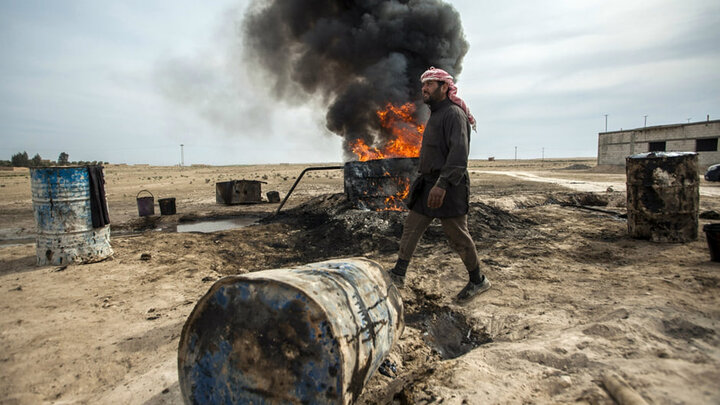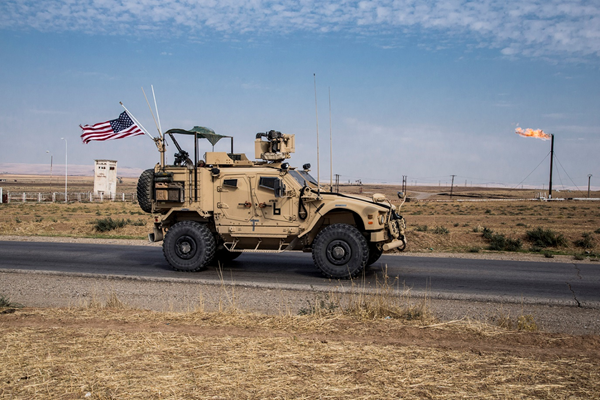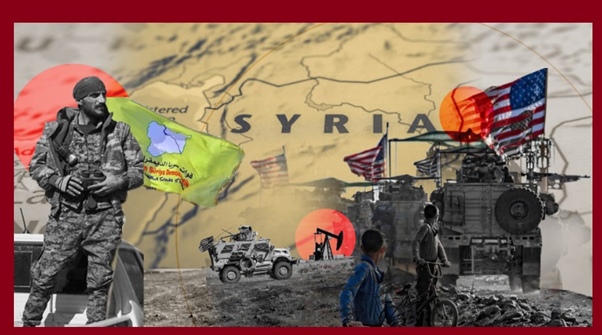Economic terrorism: America and the West’s strategy to destroy Syrian infrastructure

| The year 1402 ended for the Syrian people in a situation where, despite the removal of terrorist threats and anti-security measures, this country went through difficult economic and livelihood conditions. |
Mehr News Agency, Intergroup International: The year 1402 ended for the Syrian people in a situation where this country, despite the removal of terrorist threats and anti-security measures, experienced difficult economic and livelihood conditions. Despite the difficult economic conditions prevailing in Syria, the countries of Lebanon and Turkey in 1402 also repeatedly raised the issue of the necessity of the return of Syrian refugees. Considering that nearly 5 million Syrian refugees live in Turkey and Syria, even the return of half of them will make Syria face more difficult economic conditions. As a result, we can safely say that despite the valuable efforts of the people and the Syrian defense and security forces to defeat the terrorists and separatists, this country is facing another type of insecurity in the current situation, which is the lack of economic security and especially food security.
Adam Kugel, deputy director of the Middle East at Human Rights Watch believes that trying to return Syrian refugees to their land is not realistic in the current situation and the Syrian people They are increasingly in need of humanitarian aid and support. Therefore, it seems necessary to postpone the return of refugees to Syria until safe economic conditions are established. In 1402, Syria also faced the consequences of the 2023 earthquake in addition to the numerous damages caused by the presence of terrorists for 10 years, and in this situation, Bashar al-Assad’s government has taken a difficult path to meet the needs of the citizens.
Important reasons for the economic crisis in Syria
The decrease in the value of the Syrian lira and the financial constraints of the government and the private sector have caused ever-increasing inflation and the purchasing power of the Syrian people has greatly decreased. An objective and realistic examination of the causes of the economic crisis in Syria confronts us with the fact that a significant part of the current livelihood problems of the Syrian people have external causes. Some of these reasons are as follows:
A) Lack of control of the Syrian government over the country’s oil interests
Oil is the backbone of the Syrian economy, and the oil reserves of this country are estimated at 2.4 billion barrels and the natural gas reserves of Syria are estimated at 240 billion cubic meters. The oil fields of Syria are mainly located in the eastern and northern parts near the borders of Iraq and Turkey. Syria is known for having a special type of light oil and phosphate extraction, but considering that the Syrian government still has not been able to control its oil resources due to the interventionist and occupationist policies of the United States, the government has difficulty in meeting the expenses of running the country. faced and after this, it is difficult to supply fuel and energy.
Although the reserves of Syrian oil fields were not at a high level compared to the countries in the region, but in any case, the available resources were enough for the population of 22 million people in Syria, and the government managed Proper fuel and energy provided the needs of the country. However, now these oil fields in the eastern regions of Syria, especially in Deir Ezzor, are in the hands of Kurdish militias affiliated with the United States. The Kurds also sell oil from the mentioned fields illegally and at a low price. One of the important oil developments in Syria in 1402 was that Iranian experts and engineers agreed to undertake the repairs of the Syrian Homs refinery facilities. In this way, with the reconstruction of these facilities, better conditions will be created for Syria.
Aqeel al-Ta’i, one of the regional security experts, announced in the fall of 1402 that the American army illegally took control of Syria’s valuable resources in the provinces of Deir Ez-Zor, Al-Hasaka and Raqqa. Is. The largest oil fields in Syria are located in these areas, and elements of the American army smuggle and steal oil from Syria and transfer it to northern Iraq through the illegal al-Walid crossing.
The Americans have done something that by securing many border routes, the militias affiliated with them, the Syrian Democratic Forces or “SDF”, can easily transport oil by tanker. send to unknown destinations and receive and spend the money without any supervision. Earlier, John Bell, the CEO of Gulf Sands, announced that the Syrian Democratic Forces have extracted 37 million barrels of crude oil from this oil block, the price of which is about 2.5 billion dollars. Statistics have shown that even with unprofessional and wrong extraction from the said fields, more than 70,000 barrels are obtained daily, and the currency value of such wealth cannot be ignored.
In 1402, Syrian Foreign Minister Faisal al-Maqdad announced twice that America is the main culprit in the theft of Syrian oil, gas, and grains, and in general, the value The stolen Syrian oil from the US has reached 115 billion dollars. Al-Maqdad demanded the return of this huge wealth to the Syrian government and asked the international community and the United Nations to hold America accountable for stealing Syrian oil.
b) The cruel policy of sanctions
One of America’s cruel and hostile actions against Syria is the imposition of international economic sanctions against the people of this country. This embargo, which is so-called as Caesar’s law, caused many problems for Syrians in the past few years, and in 1402, because of this great obstacle, Damascus could not maintain its economic and commercial relations with other countries. to give Samani Caesar’s sanctions were imposed with the aim of bringing the Syrian government to its knees against the demands of the United States, but Damascus maintained its independence and tried to take the country out of danger despite the difficult and critical conditions. Sanctions have prevented any country, institution, and individual worldwide from cooperating, trading, and investing with Syrian government officials or entities. In addition, the sanctions will not allow the reconstruction of the war-torn country of Syria.
The government of Damascus has repeatedly considered the American action to impose economic sanctions on the Syrian people as economic terrorism in international forums. On the other hand, the sanctions of the United States and the European Union have blocked the assets of the Syrian government and hundreds of companies and businessmen, and have greatly limited the possibility of exporting goods to Syria or investing in this country.
C) difficult conditions in the Syrian agricultural sector
Since the beginning of the Syrian crisis, the losses of the agricultural sector in this country have increased and it has become difficult to cover production costs. Due to the insecurity and harsh conditions, a significant part of the farmers have stopped farming, and the continuous supply of water for irrigation has become difficult due to power cuts.
Jalal al-Attar, an agricultural engineer and one of the officials of the Syrian Atomic Energy Commission, said: “Due to the big problems that have arisen in the field of irrigation, farmers are looking for solutions The natives have gone. Farmers turned to buying electric generators to use water pumps when necessary, but due to the high price of fuel, this solution also did not work and the price of petroleum products is continuously increasing. Meanwhile, many agricultural machines have been damaged and farmers cannot afford to pay for the maintenance of the machines due to the lack of resources and the high cost of spare parts.
[is_logged_in] Link [/is_logged_in]
|




